A Dublin Bloom | An Interview with Dermot Bolger
Dermot Bolger is a stalwart of the Irish literary scene, having written numerous novels and plays since the mid-1980s. These include his recent successes Tanglewood, a microscopic look at the Irish property boom of 00s, and The Lonely Sea and Sky, a coming of age novel set against the backdrop of World War II. He is known to indigenous readers as a champion of working-class narratives, but the subject matter of his fiction is far-reaching and touches off many facets of Irish life. It is unsurprising then that he would choose to concern himself with Joyce‘s Ulysses, a sprawling narrative that interrogates the contradictions of life in Dublin in the early 20th century.
Humble Beginnings?
In between paltry sups of tea, Bolger details the complicated history of his fated adaptation. “I was approached by Greg Doran, who is now the artistic director of the Royal Shakespeare Company, to do a production of it,” he says. However, changes in Irish copyright law would affect his work while it was still in its infancy. Originally, the copyright on works lapsed 50 years post the author’s death. This means that when Bolger began to pen the show, Joyce’s writings were in the public domain. This was in the early 1990s.
The script that Bolger had written found life as a rehearsed reading in the United States. The once-off production was staged to an audience of 1300 people. However, when it came to stage the piece in Ireland, it was clear that they would have to contend with new state laws: “It quickly became apparent that the European Union was going to change its copyright laws, it was going to harmonise [them]. It was going to take the German model of 70 years … So [Ulysses] was going to come back into copyright.”
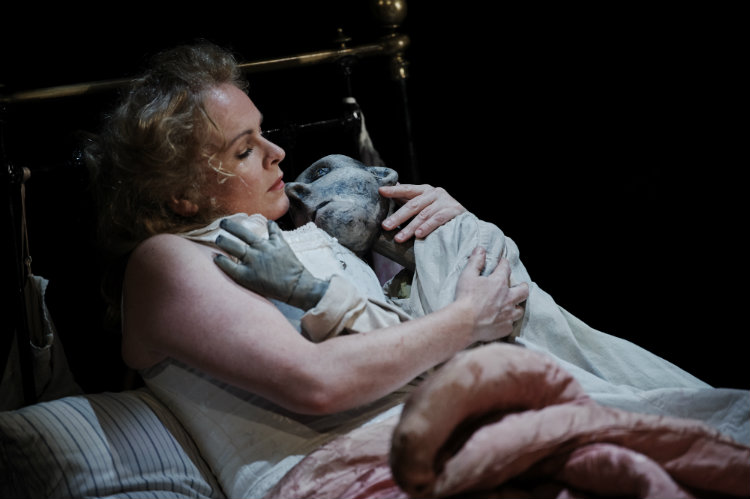
That author was not sure a theatre would commit to a project if its legal status became uncertain. Despite this, he found a work-around to ensure his project found a certain life: “The day before the copyright reverted to [Joyce’s estate], I actually did a reading of it. I got a number of my friends to do it in the Project Arts Centre. We did it at ten past nine in the morning because we figured ‘no solicitor would get here in time.’ We tried to get two men and a dog, but we couldn’t get a dog so we just did it with the two men, and we read it.”
This story is suitably Joycean, as the author himself also had to contend with innumerable laws to get his works published. Ulysses was banned in United States – copies of it were burned by the New York Postal Authority – and although contemporary audiences consider it Ireland’s national text, it would not be openly available in the country until the 1960s, 40 years after its initial publication.
Eventually, Bolger got in contact with Andy Arnold, artistic director of the Tron Theatre in Glasgow, and together the pair revived the production in 2012. With the text out of copyright once more, they were able to transform it into a full-blown play.
Metempsychosis: A Question of Adaptation
“—Metempsychosis, he said, frowning. It’s Greek: from the Greek. That means the transmigration of souls.
—O, rocks! she said. Tell us in plain words.”
This is how Leopold Bloom, the unlikely hero of Ulysses, explains a cumbersome and philosophically-charged word to his wife, Molly. This is when we meet our protagonist, and from here we follow his journey through Dublin on June 16th, 1904. Despite its reputation as a mostly-inaccessible text, the narrative of Ulysses, at its very heart, is simple: Leopold, an Irish Jew of Hungarian descent, wanders through the capital on the day his wife is to have an affair. What proves to be a challenge for some, though, is the scrupulous digging required to appreciate the novel to its fullest. Although simple at its core, the book is buried beneath several layers of irony, shifts narrative styles between chapters, and through dialogue, Joyce has sprinkled his book with meditations on art, literature, nationalism, love, sex, and smut.
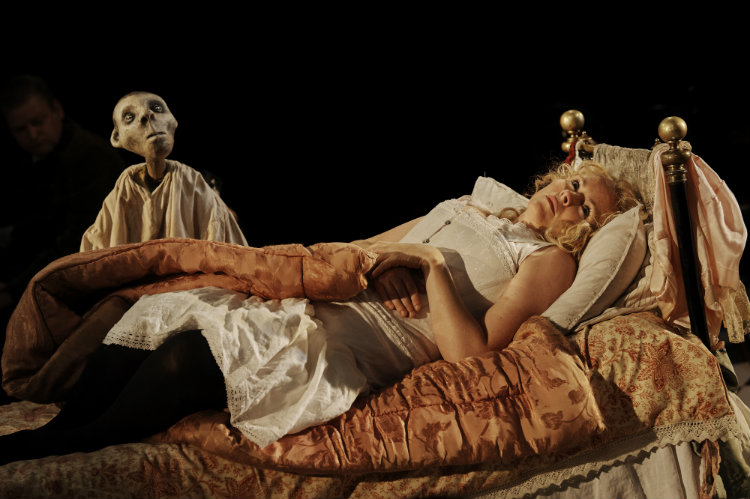
Indeed, the very idea of transmigration is central to text: it is based on Homer’s Odyssey, with each hour in the book corresponding to a year in the life of Odysseus, Homer’s quintessential hero. Others have attempted a certain kind of transmigration before: In 1967, American film director Joseph Strick adapted the book for the screen. The resulting production, although occasionally showing promise, quickly devolves into a highlight reel with wordy narrations. Critic Pauline Kael famously said of it, “[Ulysses is] an act of homage in the form of readings … plus slides.” Does Bolger feel he has streamlined the text enough for theatregoers, without isolating the scholars?
“The Abbey version is different from the Tron version,” he says. “And this version is quite different from the Abbey version of last year [the current production enjoyed a successful run in October of 2017]. There’s still the emotional essence of the book. Because the book is 18 episodes, a dazzling array of linguistic styles, covering 265,000 words, you have to figure out what to cut.”
For Bolger it became of matter of focusing on what sections best flesh out the characters, to provide them with the depth for which the novel is most famous: “In the Tron version there was a whole section in the newspaper offices, as there is in the book. A week into rehearsals, I said to Graham [McLaren, director of the Abbey version], ‘the newspaper offices isn’t really telling us anything.’ I mean, we see how Bloom’s contemporaries relate to Bloom and everything else, but nothing that we haven’t been told elsewhere.” The scene is question is the Aeolus episode, in which Bloom and Stephen Dedalus, Joyce’s insert character, miss meeting each other for the first of many times.
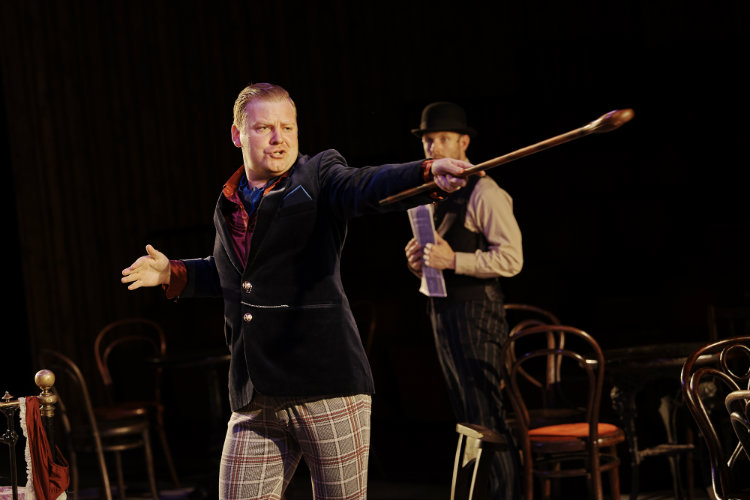
Bolger continues: “It began as the play of the book, and now it’s almost the play of the play. Novels give you a lot of scope, because generally novels aren’t read in one sitting and you’re able to have subplots. I just had to figure out the emotional journey of Bloom, and of [his marriage to Molly], what made their marriage. In the end I had to go into the areas of the book that most engaged my intellectual curiosity, but also most engaged my empathy.”
What makes the current run at the Abbey unique is the use of puppets. Some of the characters made famous in the novel are portrayed here by grotesque, uncanny caricatures of human figures. Rudy Bloom, the deceased son of Leopold and Molly, appears as a small, blue, Tolkien-esque figure, with accentuated facial features and dark, beady eyes.
The same act of transformation is seen in characters who appear in the Cyclops episode of the book: Joyce used this piece to criticise the atavistic and animalistic nature of staunch nationalism. In this section, Bloom enters Barney Kiernan’s pub only to be chastised by a man known only as ‘the Citizen’, a Republican and anti-Semite. In the Abbey version, he is gaunt and menacing. By choosing to depict him in such grotesque terms, Bolger and McLaren have only emphasised Joyce’s original critique: that atavistic nationalism is inherently malformed.
The puppets are also used to emphasise the more comedic aspects of the book. When adapting the Circe episode, in which Bloom and Dedalus experience physical manifestations of their greatest fears, characters from earlier in the text appear again, only this time as body puppets worn by the actors. The bawdy and acerbic dialogue is punctuated by slapstick comedy, as the performers milk as much humour out the situation as possible: this includes Brian Burroughs as a masturbating Buck Mulligan, and Faoileann Cunningham as a flirty and accusatory Gerty McDowell.
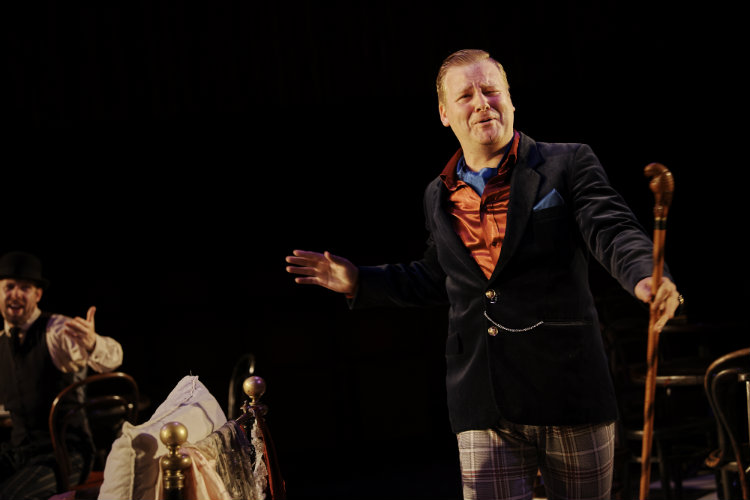
On the humour found in the book, Bolger says: “Nora Barnacle [Joyce’s partner], who believed Joyce should have stuck to the singing, used to complain that he’d keep her awake at night laughing at what he wrote. The fun thing about Ulysses is that the most theatrical bits of it – like Nighttown [the ‘Circe’ chapter] – are actually very theatrical. There’s a lot of subtle humour going on there, there’s really a lot of very Dublin humour that has gone past you before you actually realise that it’s a joke, and the humour is very contemporary. It’s something you could imagine two fellas sitting at the counter in this bar saying.”
Another departure from the book is in how Molly Bloom’s soliloquy is handled: In the novel the entirety of the last chapter, titled ‘Penelope’, is dedicated to Molly’s rambling stream of consciousness. She meditates on life with her husband and recounts the events of the day from her perspective. In the Abbey production, her speech is spliced into sections and introduced to the narrative at intermittent points. It therefore centres the narrative, and the staging that Bolger and McLaren have created reflects this: Molly, played with great delicacy by Janet Moran, spends the majority of the play in her bed in the middle of the stage. The audience, and indeed the action of the day, is centred around her, and her interruptions offer the perfect, almost grounded counterpoint to Bloom’s highfalutin musings.
“Molly’s monologue is the most theatrical part of the book,” Bolger says. “It unbalances any show because basically you would have to have everything else in the book in Act One, and Molly in Act Two.” Bolger chose to present Molly’s piece in this way to give his production a more streamlined, dreamlike quality: “When Molly is awake, and Molly is having a monologue, and Bloom is asleep, and Bloom is reliving his day in dreams, you can have that strange, fractured narrative quality that dreams have. Like, you and I could be in this pub in a dream and be on a bus two seconds later in the same dream.”
“By having Molly in the foreground, I could then begin to dig into the emotional heart of the journey of this man who has lost his son at 11 days old and has not fully recovered from that.”
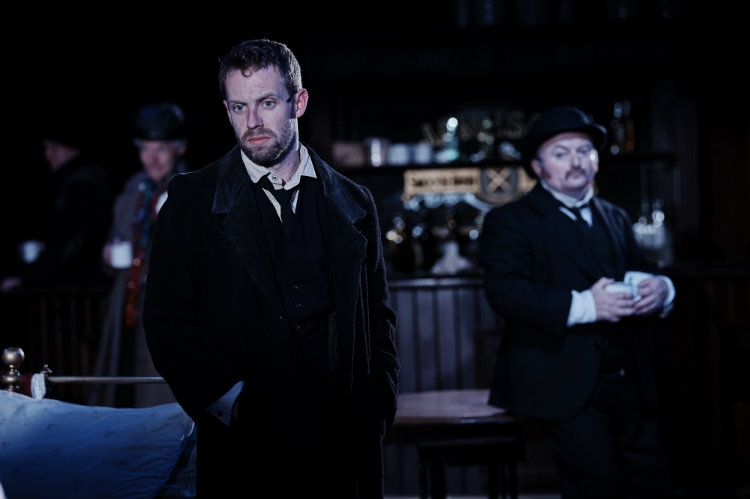
A Question of Relevance
Despite ambivalence from many readers, Ulysses continues to entertain into the 21st Century. The annual ‘Bloomsday’ festival, set every year on 16th June, attracts tourists from across the world. Fans mimic their favourite sections from the book, and map Bloom’s journey through the city minute by minute. How is it that a book so seemingly of its time, with dated reflections on the Irish psyche and the nation’s place in the world, be so appealing to contemporary readers?
Another example of transmigration it seems: “I read Ulysses for the first time at the age of 14,” Bolger says, “on the impression that it was a dirty, scandalous book. And when you’re 14, it’s not. Then I read it when I was 24, and when I began to adapt it, when I began to read it seriously, Bloom was still a year or two older than me. Then, each time it was done, I had a different relationship to Bloom, because now I envy his relative youth. I turn 60 next year.”
He continues: “It’s like an appreciation of whisky, or any great work of literature: You respond differently to it at 20 as you do at 30, as you do at 40, because you’re bringing your life experience. Some years ago, I lost my wife, and now I understand the undercurrent of grief running through Ulysses in a way that doesn’t have a direct connection, but my life experience [is there] now that I return to it.”
The theme of loss is ever-present in Ulysses. It is what eventually brings Bloom in contact with the young, bookish Dedalus. The protagonist Bloom finds a son-surrogate in the young Stephen, who is looking for a paternal figure himself in the fallout of his mother’s passing.
Bolger also finds something relatable in the character of Leopold Bloom, who is played in the Abbey production by actor David Pearse. “[Bloomsday], this alternative national day, is in honour of a Hungarian Jew, who, even in the funeral cortege to Glasnevin Cemetery [as seen in the ‘Hades’ episode], you know is an outsider.”
Bolger feels that if Joyce had chosen to make Bloom either Catholic or Protestant, that that would have come with significant baggage, denoting the character with many presuppositions based on Irish history: “He doesn’t have that same easy familiarity. If he had been Catholic, we would have had many preconceptions about his politics. If he had been Protestant, then he becomes part of the same lost, vanished ascendency class of Bram Stoker or Sheridan Le Fanu … Who wrote out of the sense that their own power was fading away. Because he was Jewish, he didn’t have any power. And because he is an outsider, he is observant of everything … He’s present, but he’s also excluded.”
In a passage near the book’s closing, Dedalus and Bloom, having squandered money in a brothel, end the night by going to a cabman’s shelter. They discuss politics, and Bloom, having been persecuted for his outsider status for the duration of the books, quips “a revolution must come on the due instalments plan.” Indeed, the same forces that oppressed Bloom and Dedalus – forces of religion, sectarianism, and oppressive attitudes towards sexuality, art, writing – have been unravelled in recent years not by divine intervention, but by slow, calculated manoeuvres by grassroots movements. Social change has come through the long, arduous work of the everyman.
We hint at this in conversation. Bolger smiles: “Yes, I think Bloom would sit very comfortably in the Dublin of 2018.”
Ulysses runs until the 21st of July. Tickets can be purchased through the Abbey Theatre website.
Featured Image: Ulysses by James Joyce, adapted by Dermot Bolger, directed by Graham McLaren – at the Abbey Theatre, Dublin, until 21 July. Photo by Ros Kavanagh

